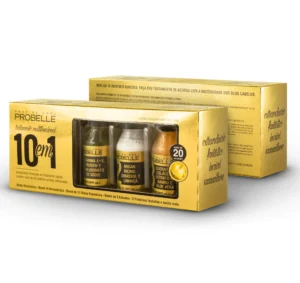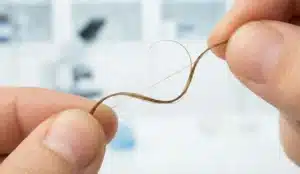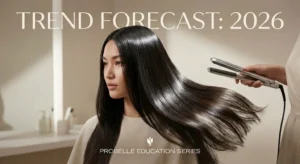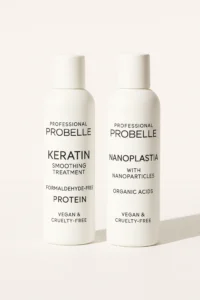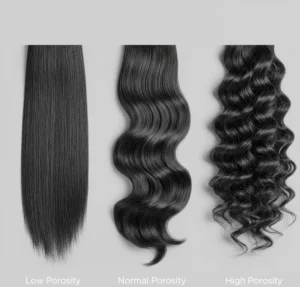Debunking the Hair Care Myth
Introduction
If you’ve ever asked yourself, “Are silicones bad for hair?” you’re not alone. Many people swear off silicones after one bad experience, believing all silicone-based products weigh hair down or cause buildup. But that’s only part of the story.
The truth? There are many types of silicones in hair products, each with unique properties. Some may not suit your hair, but others can smooth, protect, and even repair. Let’s bust one of the biggest hair care myths about silicones once and for all.
👉 If you’re curious about choosing products tailored to your hair, check out How to Choose the Right Hair Care Products for Your Hair Type.
The Chemistry of Silicones
Not All Silicones Are the Same
Silicones aren’t a single ingredient — they’re a group of compounds with a wide variety of structures. Take dimethicone, for example. It’s a polymer made of repeating units, and depending on chain length, it can act very differently:
Short-chain dimethicone: Lightweight and great for fine or oily hair. Doesn’t weigh strands down
Long-chain dimethicone: Heavier, ideal for thick, dry, or curly hair needing more moisture retention.
- Cyclomethicone: A volatile silicone that evaporates quickly, leaving a silky, non-greasy feel.
This means the same “dimethicone” on an ingredient list could behave in completely different ways.
👉 Learn more about common ingredients in our Ultimate Guide to Hair Care Products.
Charged Silicones: A Game-Changer
One of the biggest myths about silicones in hair products is that they always cause buildup. In reality, some silicones are designed to prevent that.
Silicones like amodimethicone and bis-aminopropyl dimethicone carry a positive charge. This matters because:
They deposit selectively on the most damaged areas of your hair.
Once enough is applied, the positive charges repel each other, preventing excess buildup.
The result? Smooth, frizz-free hair without that heavy or greasy feel.
👉 For a multi-benefit formula that smooths, repairs, and protects, explore our 10-in-1 Multifunctional Treatment.
Why Labels Don’t Tell the Whole Story
If you’re trying to figure out, “Are silicones bad for hair?” by just reading labels, you may end up confused. Seeing “dimethicone” doesn’t reveal:
The grade (light vs. heavy).
The formulation (how it’s blended with other ingredients).
The target hair type the product was designed for.
That’s why judging a product by the ingredient list alone can be misleading. Instead, pay attention to:
✅ The product’s claims (lightweight smoothing vs. deep repair).
✅ Reviews from people with similar hair texture and concerns.
✅ How your hair feels after a few uses — not just one.
👉 If you want more guidance, don’t miss our blog on 4 Proven Steps to Professional Hair Care Routines for All Types.
The Takeaway: Don’t Fear All Silicones
Silicones aren’t the enemy — they’re tools. Some may not suit your hair, but others can give you exactly what you’re looking for: smoothness, shine, protection, or manageability. If you avoid all silicones based on one bad product, you could be missing out on formulas that work beautifully for your hair type.
👉 Next time you shop for hair care, keep an open mind. Your perfect product might just have the right silicone in it. For more insights, check out The Ultimate Guide to Hair Care Products.
💡 Want a multifunctional treatment that uses modern, lightweight silicones? Our 10-in-1 formula is designed to deliver smoothness, heat protection, shine, and more — without buildup.
FAQ: Silicones in Hair Care
1. Are silicones bad for hair?
Not all silicones are bad for hair. Some heavier silicones may feel greasy on fine hair, but others (like amodimethicone) smooth and protect without causing buildup.
2. Do silicones cause buildup?
Some older, heavier silicones can cause buildup if not washed out properly. But modern formulas often use lightweight or water-dispersible silicones that rinse out more easily.
3. Which silicones are best for hair?
Lightweight silicones like cyclomethicone or positively charged silicones like amodimethicone are great for frizz control, shine, and protection without weighing hair down.
4. Should I avoid all silicones in hair products?
No. Avoiding all silicones could mean missing out on products that protect against heat, smooth frizz, and enhance shine. The key is finding the right formula for your hair type.
5. How do I know if a silicone-based product will work for me?
Don’t just look at the ingredient list. Instead, check the product’s claims (e.g., “lightweight smoothing”), read reviews from people with similar hair, and try it for yourself.
